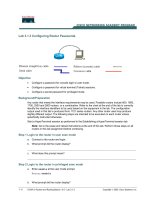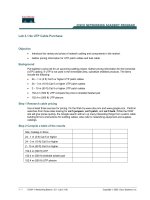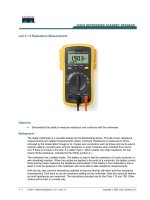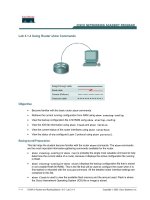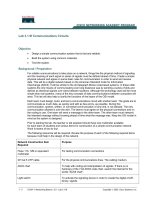Lab 3.1.9f Communications Circuits
Bạn đang xem bản rút gọn của tài liệu. Xem và tải ngay bản đầy đủ của tài liệu tại đây (70.57 KB, 2 trang )
1 - 2 CCNA 1: Networking Basics v 3.0 - Lab 3.1.9f Copyright 2003, Cisco Systems, Inc.
Lab 3.1.9f Communications Circuits
Objective
• Design a simple communication system that is fast and reliable.
• Build the system using common materials.
• Test the system.
Background / Preparation
For reliable communications to take place on a network, things like the physical method of signaling
and the meaning of each signal or series of signals must be defined ahead of time. Create a simple
physical network and agree on some basic rules for communication in order to send and receive
data. This will be a digital network based on the American Standard Code for Information
Interchange (ASCII). It will be similar to the old telegraph Morse code-based systems. In these older
systems the only means of communicating over long distances was by sending a series of dots and
dashes as electrical signals over wires between locations. Although the technology used will be more
simple than real systems, many of the key concepts of data communications between computers will
arise. This lab will also help to clarify the functions of the layers of the OSI model.
Each team must design, build, and test a communications circuit with another team. The goals are to
communicate as much data, as quickly and with as few errors, as possible During this
communication, spoken, written, or nonverbal communication of any kind, is not allowed. The only
communication allowed is over the wire. The teams must agree on the physical connections and on
the coding to use. One team will send a message to the other team. The other team must interpret
the intended message without knowing ahead of time what the message was. Keep the OSI model in
mind as the system is designed.
Prior to starting the lab, the teacher or lab assistant should have one multimeter available
for each team of students and various items for construction of a simple communication network.
Work in teams of two to four.
The following resources will be required. Review the purpose of each of the following required items
because it will help in the design of the network.
Network Construction Item
Required
Purpose
Fluke 110, 12B or equivalent
multimeter
For testing communication connections
20' Cat 5 UTP cable For the physical communications lines. The cabling medium.
ASCII chart To help with coding and interpretation of signals. If there is no
hardcopy of the 7-bit ASCII code chart, search the Internet for the
words “ACSII chart”.
Light switch To activate the signaling device in order to create the digital on/off,
binary, signals
2 - 2 CCNA 1: Networking Basics v 3.0 - Lab 3.1.9f Copyright 2003, Cisco Systems, Inc.
6v light bulbs with bulb bases or LEDs
with resistors
To act as the signaling device
6v lantern battery To power the signaling device
Wire cutters or wire strippers To adjust the length and prepare the ends of the communication lines
Layer 1 issues
Connect two pairs of wire in order to have communication in both directions, half or full duplex.
Layer 2 issues
Communicate a frame start and stop sequence. This is a sequence of bits that is different than the
character and the number bits transmitted.
Layer 3 issues
Invent an addressing scheme for hosts and networks, if it is more than point-to-point communication.
Layer 4 issues
Include some form of control to regulate quality of service. For example, error correction,
acknowledgment, windowing, or flow controls.
Layer 5 issues
Implement a way of synchronizing or pausing long conversations.
Layer 6 issues
Use a means of data representation. For example, ASCII encoded as optical bits.
Layer 7 issues
Be able to communicate an idea supplied by the instructor or invent a message.
Reflection
1. What issues arose as the communications system was being built, that apply to data
communications between computers?
_______________________________________________________________________
_______________________________________________________________________
_______________________________________________________________________
2. Analyze the communications system in terms of the OSI layers.
_______________________________________________________________________
_______________________________________________________________________
_______________________________________________________________________



